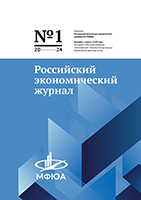Архив
Российский экономический журнал 6 / 2011
Abstracts of main articles
Concerning Utilization of Non-Monetary Factors of Anti-Inflation Policy
Author
Fetisov G.G. RAS corresponding member, Chairman of State Research Institution «Council on Study into Productive Forces under Ministry of Economic Development of Russia and RAS
Abstract
Readers are introduced to detailed theoretical and practical considerations concerning an extensive use of non-monetary methods of anti-inflation policy, hence its subsequent transformation into a factor of effective, i.e. highly diversified and competitive market economy to be shaped in this country.
Key words
inflation, cost-push inflation, monetary factors of inflation, non-monetary factors of inflation, anti-inflation policy, monetary policy, antimonopoly policy, Bank of Russia.
Russia`s Tax System: Once Again about Its Post-Soviet Evolution and Unrealized Stimulative Potential of Its Tools
Author
Petrov Yu.A. Ph.D. (Economics), Head, Financial Mechanisms of Economic Development Lab., Central Economics and Mathematics Institute, RAS
Abstract
The article sums up the author`s multi-year studies into post-soviet (since 1992) evolution of Russia`s tax system, carried out for supporting the recommendations on realization of stimulative potential of its tools, linked to lower overall tax burden on compensation and profits distributed for dividend payment to natural persons.
Key words
tax system, Russia`s tax system, tax reform, tax burden, tax rates, tax scales, social taxes, payroll, factor incomes, Ministry of Finance Russia, Ministry of Health and Social Development Russia
Real Core of Post-Soviet Economic Integration: Results of Formation and Development Prospects of Customs Union of Belarus, Kazakhstan and Russia
Author
Glaziev S.Yu. Fellow of RAS, executive secretary of Commission of Customs Union of the Republic of Belarus, the Republic of Kazakhstan and the Russian Federation
Abstract
The article reviews the results of Customs Union (CU) formation, of CU Commission activities, and substantiates the suggestions on creation of Eurasia Economic Union, including evaluation of Ukraine potential accession there to.
Key words
post-soviet space, Commonwealth of Independent States, Eurasia economic community, Customs Union of the Republic of Belarus, the Republic of Kazakhstan and the Russian Federation, Customs Union Commission, Eurasia Economic Union, Eurasia Economic Commission.
«Information Society»: Theory and Practice of Its Evolvement in the World and in Russia. Article 5. Spatial Aspects of ICT Dissemination: the Process and Results of Russia Regions and Cities Computerization
Author
Shvetsov A.N., Sc.D. (Economics), Professor, Deputy Director, Institute of Systems Analysis, RAS
Abstract
Sequel to a series of articles (his preceding four articles — «Global informatization: from futurological concept to actual reconstruction of the world», «Universal informatization as a modernization project: is modern Russia capable of managing it?», «Government computerization policy: legal and organizational aspects» and «Modern ICTs in the activities of Russian authorities: will they transform public and municipal administration?» — published in No. 4 for 2010, No. 5 for 2010, No. 1 for 2011 and Nos. 3—4 for 2011 of «Russian Economic Journal», respectively). The author attempts to substantiate the concept of spatial organization of «information society» as a subject of systems analysis and entity of public regulation, as well as identify, in the light of this concept, the specifics of ICT-space evolution in post-soviet Russia.
Key words
information space, spatial measurement of information society, regional informatization, «Regional informatization concept up to 2010»,«Standard program of information and communication technologies development and application in a subject of the Russian Federation».
Kosygin`s Reform: Revolution or evolution?
Authors
R. Gumerov, PhD (Economics), Assistant Professor, Head, Agro-industrial Complex and Consumer Market section, Macroeconomic Research Institute
A. Krukova, PhD (Economics), Senior Research Fellow, Agro-industrial Complex and Consumer Market section, Macroeconomic Research Institute
Abstract
How radical was the idea of Soviet economic reforms in 1965 and what were the reasons for its failure? Whether they consist in the "organic insolvency" of the planning system or in the inability of reformers to use its potential in the new environment? The authors` position on those matters raised in the controversial article by J.M. Golland and A.D. Nekipelov "Kosygin`s reform: a missed opportunity or mirage?" (published in Russian Economic Journal – 2010-№ 6) fundamentally different from the position of the initiators of the discussion.
Key words
Kosygin, Kosygin`s reform, socialist economy, planning system, market system, macroeconomic planning, national economic planning, March (1965) Central Committee Plenum, September (1965) Central Committee Plenum

